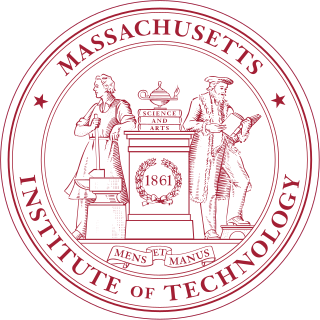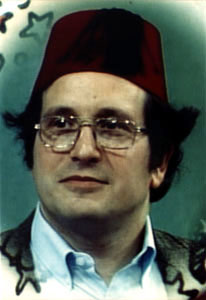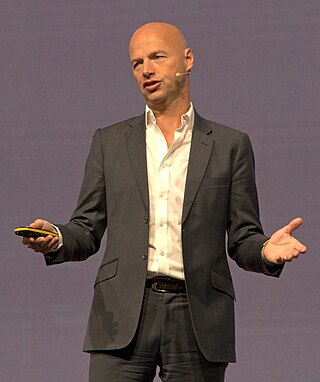The terms foobar, foo, bar, baz, and others are used as metasyntactic variables and placeholder names in computer programming or computer-related documentation. They have been used to name entities such as variables, functions, and commands whose exact identity is unimportant and serve only to demonstrate a concept.

The Massachusetts Institute of Technology (MIT) is a private land-grant research university in Cambridge, Massachusetts. Established in 1861, MIT has played a significant role in the development of many areas of modern technology and science.

Red Hat, Inc. is an American software company that provides open source software products to enterprises and is a subsidiary of IBM. Founded in 1993, Red Hat has its corporate headquarters in Raleigh, North Carolina, with other offices worldwide.

Gerald Jay Sussman is the Panasonic Professor of Electrical Engineering at the Massachusetts Institute of Technology (MIT). He received his S.B. and Ph.D. degrees in mathematics from MIT in 1968 and 1973 respectively. He has been involved in artificial intelligence (AI) research at MIT since 1964. His research has centered on understanding the problem-solving strategies used by scientists and engineers, with the goals of automating parts of the process and formalizing it to provide more effective methods of science and engineering education. Sussman has also worked in computer languages, in computer architecture and in Very Large Scale Integration (VLSI) design.

Philip Greenspun is an American computer scientist, educator, early Internet entrepreneur, and pilot who was a pioneer in developing online communities like photo.net.
The ArsDigita Community System (ACS) was an open source toolkit for developing community web applications developed primarily by developers associated with ArsDigita Corporation. It was licensed under the terms of the GNU GPL, and is one of the most famous products to be based completely on AOLserver. Although there were several forks of the project, the only one that is still actively maintained is OpenACS.
Criticism of Microsoft has followed various aspects of its products and business practices. Issues with ease of use, robustness, and security of the company's software are common targets for critics. In the 2000s, a number of malware mishaps targeted security flaws in Windows and other products. Microsoft was also accused of locking vendors and consumers in to their products, and of not following or complying with existing standards in its software. Total cost of ownership comparisons between Linux and Microsoft Windows are a continuous point of debate.

FirstClass is a client–server groupware, email, online conferencing, voice and fax services, and bulletin-board system for Windows, macOS, and Linux. FirstClass's primary markets are the higher-education and K-12 education sectors, including four of the top ten largest school districts in the United States.

AVG Technologies is a brand of cybersecurity, privacy, performance and utility software applications for desktop computers and mobile devices developed by Avast, a part of Gen Digital. AVG was a cybersecurity software company founded in 1991 and it merged into Avast following an acquisition in 2017. It typically offers freeware, earning revenues from advertisers and from users that upgrade to paid versions for access to more features.
Dropbox is a file hosting service operated by the American company Dropbox, Inc., headquartered in San Francisco, California, U.S. that offers cloud storage, file synchronization, personal cloud, and client software. Dropbox was founded in 2007 by MIT students Drew Houston and Arash Ferdowsi as a startup company, with initial funding from seed accelerator Y Combinator.

A virtual learning environment (VLE) is a system that creates an environment designed to facilitate teachers' management of educational courses for their students, especially a system using computer hardware and software, which involves distance learning. In North America, a virtual learning environment is often referred to as a "learning management system" (LMS).

Founders at Work: Stories of Startups' Early Days (2007) is a book written by Jessica Livingston composed of interviews she did with the founders of famous technology companies concerning what happened in their early years.

Udacity, Inc. is an American for-profit educational organization founded by Sebastian Thrun, David Stavens, and Mike Sokolsky offering massive open online courses.

Coursera Inc. is a U.S.-based massive open online course provider founded in 2012 by Stanford University computer science professors Andrew Ng and Daphne Koller. Coursera works with universities and other organizations to offer online courses, certifications, and degrees in a variety of subjects. In 2021 it was estimated that about 150 universities offered more than 4,000 courses through Coursera.

PeerJ is an open access peer-reviewed scientific mega journal covering research in the biological and medical sciences. It is published by a company of the same name that was co-founded by CEO Jason Hoyt and publisher Peter Binfield, with initial financial backing of US$950,000 from O'Reilly Media's O'Reilly AlphaTech Ventures, and later funding from Sage Publishing.
Treehouse or (Teamtreehouse) is an online technology school that offers beginner to advanced courses in web design, web development, mobile development and game development. Its courses are aimed at beginners looking to learn computer coding skills for a career in the tech industry.

Research Park at the University of Illinois Urbana-Champaign is a research park located in the southwest part of the University of Illinois Urbana-Champaign campus in Champaign, Illinois. Research Park is a technology hub for startup companies and corporate research and development operations. Within Research Park there are more than 120 companies employing more than 2,100 people including students and full-time technology professionals.

HackerRank is a technology company that focuses on competitive programming challenges for both consumers and businesses. Developers compete by writing programs according to provided specifications. HackerRank's programming challenges can be solved in a variety of programming languages and span multiple computer science domains.
Holly Ann Yanco is an American roboticist and computer scientist who works as Distinguished University Professor of computer science at the University of Massachusetts Lowell, and the director of the New England Robotics Validation and Experimentation (NERVE) center. She is known for her research in human–robot interaction, and has applied robotics as a way to broaden interest in computer science by schoolchildren, in assistive technology, in manufacturing, and for rescue robots.












